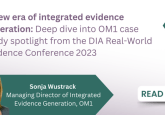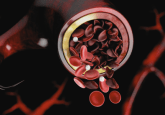GRAIL announces real-world REACH study of Galleri multi-cancer early detection test in Medicare population

GRAIL announces Galleri-Medicare – REACH: Real-world Evidence to Advance multi-Cancer early detection Health equity study.
Healthcare company GRAIL, whose stated mission is detection of cancer early when it can be cured, has announced it will run a first-of-its-kind large-scale real-world study evaluating the clinical impact of its multi-cancer early detection (MCED) test Galleri® in a diverse population of Medicare beneficiaries. This new Real-world Evidence to Advance multi-Cancer early detection Health equity (REACH) study addresses inclusion of historically under-represented populations and will generate real-world evidence (RWE) of the capacity of MCED to revolutionize cancer detection and care, as indicated in initial and ongoing trials performed under GRAIL’s Investigational Device Exemption (IDE) from the US FDA.
The American Cancer Society has reported that most cancers that result in death are found too late, when outcomes are poor, and that most cancer deaths are from cancers that lack recommended early detection screening.
“To bend the cancer mortality curve downwards, we have to shift from only screening for a few individual cancers to also screening individuals for many cancers lacking screening, which we believe will lead to better outcomes and lower diagnosis and treatment costs,” voiced GRAIL President Josh Ofman. “We expect that the data collected from the Galleri-Medicare study will add to the growing body of evidence that MCED has the potential to change the future of cancer detection as we know it.”
GRAIL’s Galleri MCED test has been shown to have the ability to detect a signal shared by more than 50 types of cancer through a routine blood draw and, if a cancer signal is detected, the Galleri test predicts the location or origin of the cancer. MCED tests work by analyzing circulating cell-free DNA using next-generation sequencing, in combination with state-of-the-art machine learning.
“New approaches to screening for cancers hold the potential to transform oncology research and care, and most importantly, improve patient outcomes,” said Jeff Allen, President & CEO of Friends of Cancer Research. “This new RWE program will augment the ongoing randomized clinical trial and generate the necessary clinical impact data to optimize the use of multi-cancer early detection testing in the broad population.”
GRAIL’s prospective PATHFINDER study has demonstrated that adding MCED screening to standard of care screening more than doubled the number of cancers detected – most of the cancers found had no recommended screening options and nearly half detected were in their early stages. Small-scale real-world data (RWD) presented by GRAIL at the American Society of Clinical Oncology Annual Meeting 2023 showed the real-world performance of Galleri MCED to be generally consistent with that seen in PATHFINDER. An additional randomized controlled clinical trial of Galleri is ongoing in England in partnership with the National Health Service.
The new Galleri-Medicare REACH study aims to compare up to 50,000 Medicare beneficiaries who have received regular care plus an annual Galleri test against a comparable group of beneficiaries who received solely routine care. Clinical impact measures of interest will include reduction in diagnosed stage IV cancers and healthcare resource utilization associated with diagnostic workup for suspected cancer. Medicare beneficiaries are an ideal population for the REACH Study as age is the most significant risk factor for cancer, meaning they face the highest unmet need for early cancer detection.
“Multi-cancer early detection holds the promise to detect more cancers earlier, improve cancer outcomes, and reduce overall cancer costs, but only if accessible to all seniors,” said Bob Ragusa, Chief Executive Officer at GRAIL. “The Galleri-Medicare study demonstrates our commitment to provide broad, equitable access to early cancer detection that is representative of the US population, including groups that are often under-represented in clinical research.”
The National Minority Quality Forum has documented that late-stage diagnosis of unscreened cancers remains disproportionately higher among Black and Brown communities. The Galleri-Medicare study will focus on enrolment of Medicare participants from under-represented populations across race, ethnicity, socioeconomic status and underserved communities.
Garfield Clunie, MD, the 123rd president of the National Medical Association, the nation’s oldest and largest association of African American/Black physicians said, “This innovative study will help provide access to game-changing cancer detection technology for our nation’s seniors and we applaud the added outreach efforts to engage those who are minority and underrepresented populations in underserved areas to further add to the growing body of representative RWE.”
Want regular updates on the latest real-world evidence news straight to your inbox? Become a member on The Evidence Base® today>>>






